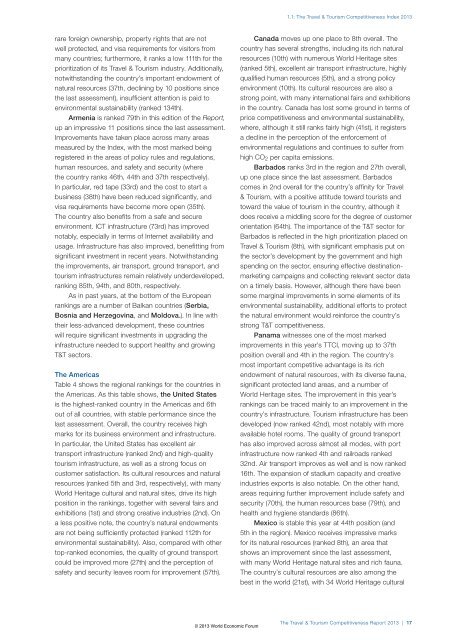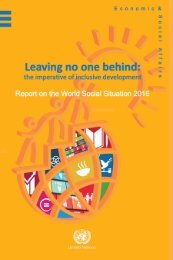The Travel & Tourism Competitiveness Report 2013
The Travel & Tourism Competitiveness Report 2013
The Travel & Tourism Competitiveness Report 2013
Create successful ePaper yourself
Turn your PDF publications into a flip-book with our unique Google optimized e-Paper software.
are foreign ownership, property rights that are not<br />
well protected, and visa requirements for visitors from<br />
many countries; furthermore, it ranks a low 111th for the<br />
prioritization of its <strong>Travel</strong> & <strong>Tourism</strong> industry. Additionally,<br />
notwithstanding the country’s important endowment of<br />
natural resources (37th, declining by 10 positions since<br />
the last assessment), insufficient attention is paid to<br />
environmental sustainability (ranked 134th).<br />
Armenia is ranked 79th in this edition of the <strong>Report</strong>,<br />
up an impressive 11 positions since the last assessment.<br />
Improvements have taken place across many areas<br />
measured by the Index, with the most marked being<br />
registered in the areas of policy rules and regulations,<br />
human resources, and safety and security (where<br />
the country ranks 46th, 44th and 37th respectively).<br />
In particular, red tape (33rd) and the cost to start a<br />
business (38th) have been reduced significantly, and<br />
visa requirements have become more open (35th).<br />
<strong>The</strong> country also benefits from a safe and secure<br />
environment. ICT infrastructure (73rd) has improved<br />
notably, especially in terms of Internet availability and<br />
usage. Infrastructure has also improved, benefitting from<br />
significant investment in recent years. Notwithstanding<br />
the improvements, air transport, ground transport, and<br />
tourism infrastructures remain relatively underdeveloped,<br />
ranking 85th, 94th, and 80th, respectively.<br />
As in past years, at the bottom of the European<br />
rankings are a number of Balkan countries (Serbia,<br />
Bosnia and Herzegovina, and Moldova.). In line with<br />
their less-advanced development, these countries<br />
will require significant investments in upgrading the<br />
infrastructure needed to support healthy and growing<br />
T&T sectors.<br />
<strong>The</strong> Americas<br />
Table 4 shows the regional rankings for the countries in<br />
the Americas. As this table shows, the United States<br />
is the highest-ranked country in the Americas and 6th<br />
out of all countries, with stable performance since the<br />
last assessment. Overall, the country receives high<br />
marks for its business environment and infrastructure.<br />
In particular, the United States has excellent air<br />
transport infrastructure (ranked 2nd) and high-quality<br />
tourism infrastructure, as well as a strong focus on<br />
customer satisfaction. Its cultural resources and natural<br />
resources (ranked 5th and 3rd, respectively), with many<br />
World Heritage cultural and natural sites, drive its high<br />
position in the rankings, together with several fairs and<br />
exhibitions (1st) and strong creative industries (2nd). On<br />
a less positive note, the country’s natural endowments<br />
are not being sufficiently protected (ranked 112th for<br />
environmental sustainability). Also, compared with other<br />
top-ranked economies, the quality of ground transport<br />
could be improved more (27th) and the perception of<br />
safety and security leaves room for improvement (57th).<br />
© <strong>2013</strong> World Economic Forum<br />
1.1: <strong>The</strong> <strong>Travel</strong> & <strong>Tourism</strong> <strong>Competitiveness</strong> Index <strong>2013</strong><br />
Canada moves up one place to 8th overall. <strong>The</strong><br />
country has several strengths, including its rich natural<br />
resources (10th) with numerous World Heritage sites<br />
(ranked 5th), excellent air transport infrastructure, highly<br />
qualified human resources (5th), and a strong policy<br />
environment (10th). Its cultural resources are also a<br />
strong point, with many international fairs and exhibitions<br />
in the country. Canada has lost some ground in terms of<br />
price competitiveness and environmental sustainability,<br />
where, although it still ranks fairly high (41st), it registers<br />
a decline in the perception of the enforcement of<br />
environmental regulations and continues to suffer from<br />
high CO2 per capita emissions.<br />
Barbados ranks 3rd in the region and 27th overall,<br />
up one place since the last assessment. Barbados<br />
comes in 2nd overall for the country’s affinity for <strong>Travel</strong><br />
& <strong>Tourism</strong>, with a positive attitude toward tourists and<br />
toward the value of tourism in the country, although it<br />
does receive a middling score for the degree of customer<br />
orientation (64th). <strong>The</strong> importance of the T&T sector for<br />
Barbados is reflected in the high prioritization placed on<br />
<strong>Travel</strong> & <strong>Tourism</strong> (8th), with significant emphasis put on<br />
the sector’s development by the government and high<br />
spending on the sector, ensuring effective destinationmarketing<br />
campaigns and collecting relevant sector data<br />
on a timely basis. However, although there have been<br />
some marginal improvements in some elements of its<br />
environmental sustainability, additional efforts to protect<br />
the natural environment would reinforce the country’s<br />
strong T&T competitiveness.<br />
Panama witnesses one of the most marked<br />
improvements in this year’s TTCI, moving up to 37th<br />
position overall and 4th in the region. <strong>The</strong> country’s<br />
most important competitive advantage is its rich<br />
endowment of natural resources, with its diverse fauna,<br />
significant protected land areas, and a number of<br />
World Heritage sites. <strong>The</strong> improvement in this year’s<br />
rankings can be traced mainly to an improvement in the<br />
country’s infrastructure. <strong>Tourism</strong> infrastructure has been<br />
developed (now ranked 42nd), most notably with more<br />
available hotel rooms. <strong>The</strong> quality of ground transport<br />
has also improved across almost all modes, with port<br />
infrastructure now ranked 4th and railroads ranked<br />
32nd. Air transport improves as well and is now ranked<br />
16th. <strong>The</strong> expansion of stadium capacity and creative<br />
industries exports is also notable. On the other hand,<br />
areas requiring further improvement include safety and<br />
security (70th), the human resources base (79th), and<br />
health and hygiene standards (86th).<br />
Mexico is stable this year at 44th position (and<br />
5th in the region). Mexico receives impressive marks<br />
for its natural resources (ranked 8th), an area that<br />
shows an improvement since the last assessment,<br />
with many World Heritage natural sites and rich fauna.<br />
<strong>The</strong> country’s cultural resources are also among the<br />
best in the world (21st), with 34 World Heritage cultural<br />
<strong>The</strong> <strong>Travel</strong> & <strong>Tourism</strong> <strong>Competitiveness</strong> <strong>Report</strong> <strong>2013</strong> | 17

















